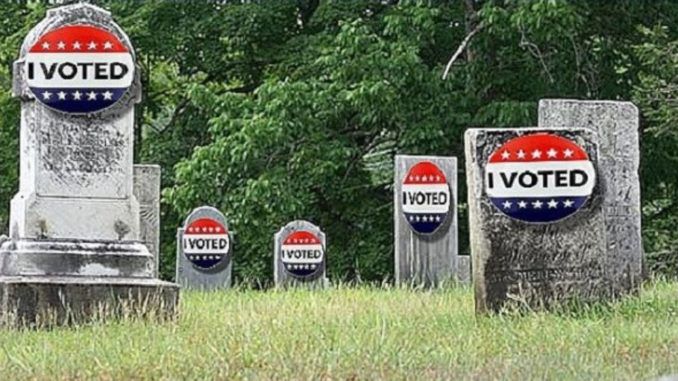
Massachusetts has introduced new election rules that will allow dead people’s votes to be counted in the upcoming November election, state officials have announced.
The state legislature passed the new laws this year as a response to the COVID-19 pandemic.
Massachusetts Secretary of State Bill Galvin announced the move to count dead people’s votes on Monday while telling voters the new law is “temporary” for 2020 and won’t apply to all future elections.
“It’s pandemic-era time,” Galvin said at a news conference, WBZ-TV reported.
“So we had to expand the time for voting.”
The new law applies to voters in Massachusetts who went through the effort to vote early but then died before the November 3 election.
Before now, early voting in the Bay State was 10 days before an election, and if a person voted early and was discovered to have died prior to Election Day, that voter’s ballot would not be counted, according to The Blaze.
“These are people who are alive and competent when they voted, but they may have died unexpectedly after they voted,” the attorney general said.
“In past times, if the local officials knew they were dead — had died — even though they had legally voted when they cast the ballot, they would have discarded the ballot, not counted it.”
But apparently, that did not sit well with the state’s leaders.
According to the Boston Globe, the “temporary pandemic-era law passed this summer” by the legislature is a notable shift in the state’s voting rules.
This year early voting in Massachusetts has been extended by an additional 20 days, giving voters essentially a month to cast their votes.
And not only has the window expanded, but the definition of what constitutes a legitimate vote has also apparently been changed, too.
Now Massachusetts voters who die after casting their early ballot but before Election Day will have their ballots included in the final tally.
The new provision that allows the votes of the dead to suddenly count comes thanks to language slipped into the state’s early voting expansion bill.
The law bars election officials from rejecting an early or absentee ballot this year “solely because the voter became ineligible to vote by reason by death after casting the ballot,” the Globe reported.
Massachusetts is not the first state to have such a provision.
The Globe said at least 11 states have similar laws, including Florida and Hawaii.
As of two years ago, at least 17 state states had explicitly rejected counting ballots of people who died before the election, the Globe noted.
Baxter Dmitry
Email: [email protected]
Follow: @baxter_dmitry
Latest posts by Baxter Dmitry (see all)
Related posts:
Views: 0
 RSS Feed
RSS Feed

















 October 9th, 2020
October 9th, 2020  Awake Goy
Awake Goy 

 Posted in
Posted in  Tags:
Tags: 
















